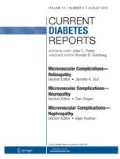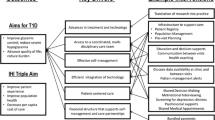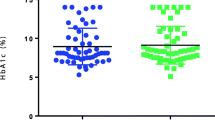Abstract
Emerging adults with type 1 diabetes are at risk for poor glycemic control, gaps in medical care, and adverse health outcomes. With the increasing incidence in type 1 diabetes in the pediatric population, there will be an increase in the numbers of teens and young adults transferring their care from pediatric providers to adult diabetes services in the future. In recent years, the topic of transitioning pediatric patients with type 1 diabetes to adult diabetes care has been discussed at length in the literature and there have been many observational studies. However, there are few interventional studies and, to date, no randomized clinical trials. This paper discusses the rationale for studying this important area. We review both observational and interventional literature over the past several years, with a focus on new research. In addition, important areas for future research are outlined.


Similar content being viewed by others
References
Papers of particular interest, published recently, have been highlighted as: • Of importance •• Of major importance
Dabelea D, Bell RA, D’Agostino Jr RB, et al. Incidence of diabetes in youth in the United States. JAMA. 2007;297:2716–24.
Liese AD, D’Agostino Jr RB, Hamman RF, et al. The burden of diabetes mellitus among US youth: prevalence estimates from the SEARCH for Diabetes in Youth Study. Pediatrics. 2006;118:1510–8.
Vehik K, Hamman RF, Lezotte D, et al. Increasing incidence of type 1 diabetes in 0- to 17-year-old Colorado youth. Diabetes Care. 2007;30:503–9.
Dabelea D, DeGroat J, Sorrelman C, et al. Diabetes in navajo youth: prevalence, incidence, and clinical characteristics: the SEARCH for Diabetes in Youth Study. Diabetes Care. 2009;32 Suppl 2:S141–7.
Liu LL, Yi JP, Beyer J, et al. Type 1 and type 2 diabetes in asian and pacific islander U.S. youth: the SEARCH for diabetes in youth study. Diabetes Care. 2009;32 Suppl 2:S133–40.
Lawrence JM, Mayer-Davis EJ, Reynolds K, et al. Diabetes in hispanic american youth: prevalence, incidence, demographics, and clinical characteristics: the SEARCH for diabetes in youth study. Diabetes Care. 2009;32 Suppl 2:S123–32.
Mayer-Davis EJ, Beyer J, Bell RA, et al. Diabetes in african american youth: prevalence, incidence, and clinical characteristics: the SEARCH for diabetes in youth study. Diabetes Care. 2009;32 Suppl 2:S112–22.
Bell RA, Mayer-Davis EJ, Beyer JW, et al. Diabetes in non-hispanic white youth: prevalence, incidence, and clinical characteristics: the SEARCH for diabetes in youth study. Diabetes Care. 2009;32 Suppl 2:S102–11.
Harjutsalo V, Sjoberg L, Tuomilehto J. Time trends in the incidence of type 1 diabetes in Finnish children: a cohort study. Lancet. 2008;371:1777–82.
Patterson CC, Dahlquist GG, Gyurus E, Green A, Soltesz G. Incidence trends for childhood type 1 diabetes in europe during 1989–2003 and predicted new cases 2005-20: a multicentre prospective registration study. Lancet. 2009;373:2027–33.
Ehehalt S, Dietz K, Willasch AM, Neu A, Baden-Wurttemberg Diabetes Incidence Registry (DIARY) Group. Epidemiological perspectives on type 1 diabetes in childhood and adolescence in Germany: 20 years of the Baden-Wurttemberg Diabetes Incidence Registry (DIARY). Diabetes Care. 2010;33:338–40.
Lawrence JM, Bell RA, Dabelea D, et al. Trends in incidence of type 1 diabetes among non-hisptanic white (NHW) youth in the US, 2002–2009. Diabetes. 2012;61:A52.
Mayer-Davis E, Dabelea D, Talton JW, et al. Increase in prevalence of type 1 diabetes from the SEARCH for Diabetes in Youth study: 2001 to 2009 [Abstract]. Diabetes. 2012;61:A322.
Petitti DB, Klingensmith GJ, Bell RA, et al. Glycemic control in youth with diabetes: the SEARCH for diabetes in Youth Study. J Pediatr. 2009;155:668–72.
Arnett JJ. Emerging adulthood. A theory of development from the late teens through the twenties. Am Psychol. 2000;55:469–80.
Arnett JJ. Emerging adulthood: the winding road from the late teens through the twenties. New York: Oxford University Press; 2004.
•• Peters A, Laffel L, The American Diabetes Association Transitions Working Group. Diabetes care for emerging adults: recommendations for transition from pediatric to adult diabetes care systems. Diabetes Care. 2011;34:2477–85. These consensus guidelines for health care transition in type 1 diabetes were published by the American Diabetes Association in 2011 and encompass representation from many other professional societies.
Sparud-Lundin C, Ohrn I, Danielson E. Redefining relationships and identity in young adults with type 1 diabetes. J Adv Nurs. 2010;66:128–38.
Rasmussen B, Ward G, Jenkins A, King SJ, Dunning T. Young adults’ management of Type 1 diabetes during life transitions. J Clin Nurs. 2011;20:1981–92.
• Hanna KM. A framework for the youth with type 1 diabetes during the emerging adulthood transition. Nurs Outlook. 2012. doi:10.1016/j.outlook.2011.10.005. This new review article provides a comprehensive examination of the developmental challenges of emerging adulthood in the setting of health care transition in type 1 diabetes.
Wysocki T, Hough BS, Ward KM, Green LB. Diabetes mellitus in the transition to adulthood: adjustment, self-care, and health status. J Dev Behav Pediatr. 1992;13:194–201.
Bryden KS, Peveler RC, Stein A, Neil A, Mayou RA, Dunger DB. Clinical and psychological course of diabetes from adolescence to young adulthood: a longitudinal cohort study. Diabetes Care. 2001;24:1536–40.
Bryden KS, Dunger DB, Mayou RA, Peveler RC, Neil HA. Poor prognosis of young adults with type 1 diabetes: a longitudinal study. Diabetes Care. 2003;26:1052–7.
Insabella G, Grey M, Knafl G, Tamborlane W. The transition to young adulthood in youth with type 1 diabetes on intensive treatment. Pediatr Diabetes. 2007;8:228–34.
Feltbower RG, Bodansky HJ, Patterson CC, et al. Acute complications and drug misuse are important causes of death for children and young adults with type 1 diabetes: results from the Yorkshire register of diabetes in children and young adults. Diabetes Care. 2008;31:922–6.
White PH, McManus MA, McAllister JW, Cooley WC. A primary care quality improvement approach to health care transition. Pediatr Ann. 2012;41:e1–7.
American Academy of Pediatrics, American Academy of Family Physicians, American College of Physicians-American Society of Internal Medicine. A consensus statement on health care transitions for young adults with special health care needs. Pediatrics. 2002;110:1304–6.
Rosen DS, Blum RW, Britto M, Sawyer SM, Siegel DM. Transition to adult health care for adolescents and young adults with chronic conditions: position paper of the Society for Adolescent Medicine. J Adolesc Health. 2003;33:309–11.
American Academy of Pediatrics AAoFPa. Supporting the health care transition from adolescence to adulthood in the medical home. Pediatrics. 2011;128:182–200.
Laing SP, Swerdlow AJ, Slater SD, et al. The British Diabetic Association Cohort Study, I: all-cause mortality in patients with insulin-treated diabetes mellitus. Diabet Med. 1999;16:459–65.
Jacobson AM, Hauser ST, Willett JB, et al. Psychological adjustment to IDDM: 10-year follow-up of an onset cohort of child and adolescent patients. Diabetes Care. 1997;20:811–8.
Jacobson AM, Hauser ST, Willett J, Wolfsdorf JI, Herman L. Consequences of irregular vs continuous medical follow-up in children and adolescents with insulin-dependent diabetes mellitus. J Pediatr. 1997;131:727–33.
Wills CJ, Scott A, Swift PG, Davies MJ, Mackie AD, Mansell P. Retrospective review of care and outcomes in young adults with type 1 diabetes. BMJ. 2003;327:260–1.
Joergensen C, Hovind P, Schmedes A, Parving HH, Rossing P. Vitamin D levels, microvascular complications, and mortality in type 1 diabetes. Diabetes Care. 2011;34:1081–5.
Frank M. Factors associated with non-compliance with a medical follow-up regimen after discharge from a pediatric diabetes clinic. Can J Diabetes. 1996;20:13–20.
Pacaud D, McConnell B, Huot C, Aebi C, Yale JF. Transition from pediatric to adult care for insulin-dependent diabetes patients. Can J Diabetes. 1996;20:14–20.
Pacaud D, Yale JF, Stephure D, Dele-Davies H. Problems in transition from pediatric care to adult care for individuals with diabetes. Can J Diabetes. 2005;40:29–35.
• Garvey KC, Wolpert HA, Rhodes ET, et al. Health care transition in patients with type 1 diabetes: young adult experiences and relationship to glycemic control. Diabetes Care. 2012;35(8):1716–22. This is the largest cross-sectional study to date describing the health care transition experiences as reported by emerging adults with type 1 diabetes in the United States. Associations are examined between transition preparation, gaps between pediatric and adult diabetes care, and glycemic control.
Holmes-Walker DJ, Llewellyn AC, Farrell K. A transition care program which improves diabetes control and reduces hospital admission rates in young adults with type 1 diabetes aged 15–25 years. Diabet Med. 2007;24:764–9.
Mainous III AG, Koopman RJ, Gill JM, Baker R, Pearson WS. Relationship between continuity of care and diabetes control: evidence from the Third National Health and Nutrition Examination Survey. Am J Public Health. 2004;94:66–70.
Kipps S, Bahu T, Ong K, et al. Current methods of transfer of young people with Type 1 diabetes to adult services. Diabet Med. 2002;19:649–54.
Busse FP, Hiermann P, Galler A, et al. Evaluation of patients’ opinion and metabolic control after transfer of young adults with type 1 diabetes from a pediatric diabetes clinic to adult care. Horm Res. 2007;67:132–8.
Sparud-Lundin C, Ohrn I, Danielson E, Forsander G. Glycaemic control and diabetes care utilization in young adults with type 1 diabetes. Diabet Med. 2008;25:968–73.
• Nakhla M, Daneman D, To T, Paradis G, Guttmann A. Transition to adult care for youths with diabetes mellitus: findings from a Universal Health Care System. Pediatrics. 2009;124:e1134–41. This database study describes the largest observation of transitioning patients with type 1 diabetes reported to date (1507 patients). Rates of pre- and post-transition diabetes-related hospitalizations as well as retinal examinations are reported..
American Diabetes Association. Standards of medical care in diabetes–2012. Diabetes Care. 2012;35 Suppl 1:S11–63.
Neu A, Losch-Binder M, Ehehalt S, Schweizer R, Hub R, Serra E. Follow-up of adolescents with diabetes after transition from pediatric to adult care: results of a 10-year prospective study 9. Exp Clin Endocrinol Diabetes. 2010;118:353–5.
Dovey-Pearce G, Hurrell R, May C, Walker C, Doherty Y. Young adults’ (16–25 years) suggestions for providing developmentally appropriate diabetes services: a qualitative study. Health Soc Care Community. 2005;13:409–19.
Visentin K, Koch T, Kralik D. Adolescents with type 1 diabetes: transition between diabetes services. J Clin Nurs. 2006;15:761–9.
Orr DP, Fineberg NS, Gray DL. Glycemic control and transfer of health care among adolescents with insulin dependent diabetes mellitus. J Adolesc Health. 1996;18:44–7.
Lane JT, Ferguson A, Hall J, et al. Glycemic control over 3 years in a young adult clinic for patients with type 1 diabetes. Diabetes Res Clin Pract. 2007;78:385–91.
Logan J, Peralta E, Brown K, Moffett M, Advani A, Leech N. Smoothing the transition from paediatric to adult services in type 1 diabetes. J Diabetes Nurs. 2008;12:328–38.
Van Walleghem N, Macdonald CA, Dean HJ. Evaluation of a systems navigator model for transition from pediatric to adult care for young adults with type 1 diabetes. Diabetes Care. 2008;31:1529–30.
Cadario F, Prodam F, Bellone S, et al. Transition process of patients with type 1 diabetes (T1DM) from pediatric to the adult health care service: a hospital-based approach. Clin Endocrinol (Oxf). 2009;71:346–50.
• Markowitz JT, Laffel LM. Transitions in care: support group for young adults with type 1 diabetes. Diabet Med. 2012;29:522–5. This is a recent study showing an important model for young adult support during the period of transition. Participation in a young adult support group for patients with type 1 diabetes was associated with decreased self-reported diabetes burden and improvements in diabetes self care.
Polonsky WH, Anderson BJ, Lohrer PA, et al. Assessment of diabetes-related distress. Diabetes Care. 1995;18:754–60.
Weinger K, Butler HA, Welch GW, La Greca AM. Measuring diabetes self-care: a psychometric analysis of the Self-Care Inventory-Revised with adults. Diabetes Care. 2005;28:1346–52.
Sequeira PA, Weigensberg M, Pyatak B, et al. Emergency healthcare utilization for young adults (YA) with type 1 diabetes (T1D) who have aged out of pediatric healthcare. Diabetes. 2012;61 Suppl 1:A323.
Diabetes Control and Complications Trial Research Group. Effect of intensive diabetes treatment on the development and progression of long-term complications in adolescents with insulin-dependent diabetes mellitus: Diabetes Control and Complications Trial. J Pediatr. 1994;125:177–88.
The DCCT Research Group. The effect of intensive treatment of diabetes on the development and progression of long-term complications in insulin-dependent diabetes mellitus. N Engl J Med. 1993;329:977–86.
Krolewski AS, Warram JH, Christlieb AR, Busick EJ, Kahn CR. The changing natural history of nephropathy in type I diabetes. Am J Med. 1985;78:785–94.
Borch-Johnsen K, Kreiner S, Deckert T. Diabetic nephropathy–susceptible to care? A cohort-study of 641 patients with type 1 (insulin-dependent) diabetes. Diabetes Res. 1986;3:397–400.
Jacobson AM, Adler AG, Derby L, Anderson BJ, Wolfsdorf JI. Clinic attendance and glycemic control. Study of contrasting groups of patients with IDDM. Diabetes Care. 1991;14:599–601.
Kawahara R, Amemiya T, Yoshino M, Miyamae M, Sasamoto K, Omori Y. Dropout of young non-insulin-dependent diabetics from diabetic care. Diabetes Res Clin Pract. 1994;24:181–5.
Kurlander JE, Kerr EA, Krein S, Heisler M, Piette JD. Cost-related nonadherence to medications among patients with diabetes and chronic pain: factors beyond finances. Diabetes Care. 2009;32:2143–8.
Svensson M, Sundkvist G, Arnqvist HJ, et al. Signs of nephropathy may occur early in young adults with diabetes despite modern diabetes management: results from the nationwide population-based diabetes incidence study in Sweden (DISS). Diabetes Care. 2003;26:2903–9.
Hillier TA, Pedula KL. Complications in young adults with early-onset type 2 diabetes: losing the relative protection of youth. Diabetes Care. 2003;26:2999–3005.
Rydall AC, Rodin GM, Olmsted MP, Devenyi RG, Daneman D. Disordered eating behavior and microvascular complications in young women with insulin-dependent diabetes mellitus. N Engl J Med. 1997;336:1849–54.
Mayer-Davis EJ, Ma B, Lawson A, et al. Cardiovascular disease risk factors in youth with type 1 and type 2 diabetes: implications of a factor analysis of clustering. Metab Syndr Relat Disord. 2009;7:89–95.
Rewers A, Chase HP, Mackenzie T, et al. Predictors of acute complications in children with type 1 diabetes. JAMA. 2002;287:2511–8.
McGrady ME, Laffel L, Drotar D, Repaske D, Hood KK. Depressive symptoms and glycemic control in adolescents with type 1 diabetes: mediational role of blood glucose monitoring. Diabetes Care. 2009;32:804–6.
Goebel-Fabbri AE, Fikkan J, Franko DL, Pearson K, Anderson BJ, Weinger K. Insulin restriction and associated morbidity and mortality in women with type 1 diabetes. Diabetes Care. 2008;31:415–9.
Laing SP, Swerdlow AJ, Slater SD, et al. The British Diabetic Association Cohort Study, II: cause-specific mortality in patients with insulin-treated diabetes mellitus. Diabet Med. 1999;16:466–71.
Weissberg-Benchell J, Wolpert H, Anderson BJ. Transitioning from pediatric to adult care: a new approach to the post-adolescent young person with type 1 diabetes. Diabetes Care. 2007;30:2441–6.
Wolpert HA, Anderson BJ, Weissberg-Benchell J. Transitions in care: meeting the challenges of type 1 diabetes in young adults. American Diabetes Association. 2009.
Disclosure
Conflicts of interest: K.C. Garvey: has received grant support from a K12 Career Development Grant (K12DK094721); J.T. Markowitz: has received grant support from the NIDDK (1K23DK092335) to investigate the transition from pediatric to adult care; L.M.B. Laffel: has received grant support from Bayer and is PI/Program Director of an NIH K12 Career Development Grant (K12DK094721); has received donations from Eleanor Chesterman Beatson Fund, Maria Griffin Drury Fund, and Katharine Adler Astrove Youth Education Fund; has been a consultant for Johnson and Johnson, Eli Lilly and Co., Sanofi-Aventis, Bristol Myers Squibb, Menarini, LifeScan/Anima, and Oshadi Administrative Devices.
Author information
Authors and Affiliations
Corresponding author
Rights and permissions
About this article
Cite this article
Garvey, K.C., Markowitz, J.T. & Laffel, L.M.B. Transition to Adult Care for Youth with Type 1 Diabetes. Curr Diab Rep 12, 533–541 (2012). https://doi.org/10.1007/s11892-012-0311-6
Published:
Issue Date:
DOI: https://doi.org/10.1007/s11892-012-0311-6




